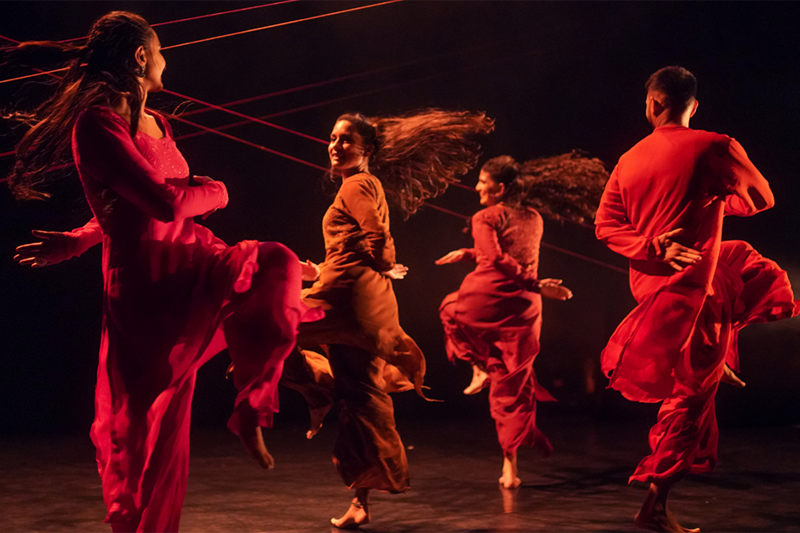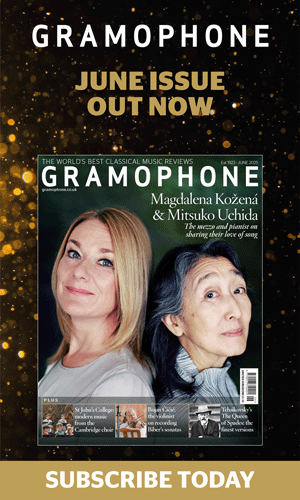Rediscovering Holst's Sāvitri
Meurig Bowen
Thursday, April 28, 2022
Britten Sinfonia and Pagrav Dance Company join forces at the Barbican next week to explore this fascinating work afresh
Over a century ago, Holst became proficient in Sanskrit and absorbed himself, almost to the point of obsession, in ancient Vedic philosophy. One outcome was the chamber opera Sāvitri, and now, argues Britten Sinfonia's Artistic Director, it's time to explore it afresh
Gustav Holst grew up in Cheltenham in England - dubbed the ‘Calcutta in the Cotswolds’. This enclave of military and civil service expatriates returning from the subcontinent in the 19th century – and known retinues of Indian servants – surely had an impact on his early years and may help to explain why, for a decade or so in his 20s and 30s, his music was steeped in a fascination with Hindu literature, mythology and philosophy.
From 1899-1905 he toiled on a grandiose, and eventually unperformed, opera, Sita. A symphonic poem in 1903, Indra, led to nearly 30 settings of hymns from the Rig Veda, a cantata The Cloud Messenger and a chamber opera, Sāvitri, based on an episode from the Sanskrit epic, the Mahabharata.

The Pagrav Dance Company join Britten Sinfonia at the Barbican next week for Holst's Sāvitri
I love the fact that, well over a century ago, this socialist, teetotal, vegetarian trombonist from Gloucestershire took the trouble to become proficient in Sanskrit and absorbed himself, almost to the point of obsession, in ancient Vedic philosophy. But is that a good enough reason for placing Sāvitri at the centre of a concert in the Barbican on May 4? Is Sāvitri merely quaint and of another age, or can it be re-appraised successfully in our own very different times? Why should we bother?
At first glance, giving Sāvitri a wide berth might seem a good call. Written in Edwardian England by a man who never set foot in India, it was in step – if not in spirit – with a European vogue for Orientalism which appropriated Indian culture on a whim. But the sincerity and depth of Holst’s literary interest means there is nothing exploitative or opportunistic about Sāvitri. There is no attempt at musical exoticism, the Indian flavours coming only from its subject matter. The opera, with its radically spare textures, was ahead rather than of its time, a unique departure in early 20th century British music. A breakthrough work for Holst, more widely, it was a prototype for the chamber operas of Britten and others.
At only 35 minutes long, Sāvitri’s concision aligns with a perfectly judged subtlety and restraint – yet, through its musing on love and death, it expresses something epic and universal too. With performances of sublime conviction, all this has the potential to resonate brightly and gain fresh meaning amidst the dilemmas facing our own troubled world.
Beyond that, giving Sāvitri, or indeed any piece of music, new life in 2022 has to be all about creating compelling and sympathetic context. That means what comes before and after it in the concert, and how we present the work in itself.
In 1978, Scottish Opera placed Sāvitri in a triple-bill alongside Purcell’s Dido and Aeneas and Edward Harper’s Fanny Robin - all starring Janet Baker. We’re accompanying it with pieces by Benjamin Britten and Grace Williams. Looking beyond the obvious, rediscovering and dusting off can be as exciting as unleashing the brand new and there’s a wealth of music that deserves to be rescued from past neglect - by accomplished composers such as Grace Williams who, often through social norms of the time, struggled to find favour in their own lifetimes.
With appealing impracticality, Holst wanted Sāvitri to be performed outdoors in a forest. Instead, how about joining Holst’s music with another classical tradition – North Indian Kathak dance as performed by Pagrav Dance Company – and seeing where the combination of two different artistic vocabularies leads us? For Pagrav’s Artistic Director Urja Desai Thakore, the millennia-old Kathak form is ever evolving, and this is the first time she has choreographed for an opera. Urja, like many others, is new to Holst’s music and she’s keen to avoid her interpretation being ‘literal or merely exotic’ – matching well the lack of exoticism in Holst’s score. None of the dancers will be assigned any of Holst’s characters, Sāvitri, her husband Satyavan and Death. Instead, she explains, ‘they are like three molecules of one actor, addressing the inevitability of death, facing it, not resisting it.’
Pagrav’s involvement is one way of reflecting how Britain is so different now from Holst’s own time, and another will be how the concert finishes. Bowing out in her final concert as Britten Sinfonia’s much-admired leader, violinist Jacqueline Shave will fashion a relaxed coda to Sāvitri with her longstanding trio partners, tabla virtuoso Kuljit Bhamra and guitarist John Parricelli. Their stylistic traverse of western and Indian classical, folk and jazz is the kind of cosmopolitan musical encounter that Holst could never have envisaged but I hope he would approve.
Meurig Bowen is Artistic Director and Chief Executive of Britten Sinfonia. Sāvitri will be performed at London's Barbican on May 4 - full details here.
You can hear a recording of Sāvitri featuring Janet Baker below, via Apple Music:








